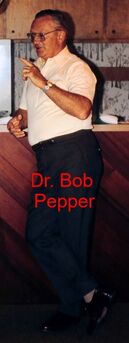
A tribute to my mentor Bob Pepper,OD, FCOVD

Pepper Principles
No, this is not about cooking. There actually was a real Dr. Pepper

Wisdom of Bob Pepper, OD, FCOVD
broken down in simple sentences...

The basic 15
1. To perform efficiently without stress you must be in the present.

2. Once you have your visual system together, you can do anything you wish as long as you do
it one step at a time.

3. A mistake is the best friend you have

4. When under stress, you return to a previously learned level of performance.

5. Progress from the known to the unknown, not vice versa.

6. You gain power by relaxing in depth.

7. Beginnings are hard.

8. Endings are hard.
|
|
9. Near the end you run into "I've got it made", or "Oh, oh, can I make it?" |

10. If you are in tune play your hunch; if not, don't.

11. Allow your recoveries. Most accidents are caused from not allowing the recovery.
.

12. High achievers can do the wrong thing and get the right answer, but it causes stress.

13. You must earn the right to become a "pro".

14. You can only consciously do one thing at a time.

15. Rhythm allows you to do more than one thing at a time.

The following were less commonly emphasized by Bob, plus I snuck them in from other mentors in the field:
16 If you feel bad about making a mistake you are likely to repeat it.
16 If you feel bad about making a mistake you are likely to repeat it.

17. Bad feelings warn in time that you are about to make a mistake so you can change it.
|
18. Vision is self monitoring, self directing, and self correcting. Larry McDonald, OD is credited with this statement. |
|

19. The human vision is the only sense a computer can not yet beat and it does it by the number of bits taken in at one time. This also is Larry's.

20. Concentration and relaxation are almost the same word. Concentration requires relaxation. I came up with this one, but remember the definition of originality: the ability to conceal your sources.
|
|
The last is more of a tool used in vision therapy than a principle:
21. To learn from a mistake, when you make the mistake: 1. stop 2. look at your foundation (the foundation includes everything: what you got right as well as what you got wrong, the conditions, etc.) 3. start over |